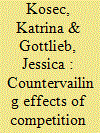| Srl | Item |
| 1 |
ID:
165403


|
|
|
|
|
| Summary/Abstract |
Political competition is widely recognized as a mediator of public goods provision through its salutary effect on incumbents’ electoral incentives. We argue that political competition additionally mediates public goods provision by reducing the efficiency of legislative bargaining. These countervailing forces may produce a net negative effect in places with weak parties and low transparency—typical of many young democracies. We provide evidence of a robust negative relationship between political competition and local public goods using panel data from Mali. Tests of mechanisms corroborate our interpretation of this relationship as evidence of legislative bargaining inefficiencies. To explore the generalizability of these findings, we analyze cross-country panel data and show that political competition leads to better (worse) public goods provision under high (low) levels of party system institutionalization. The paper sheds light on why political competition is only selectively beneficial, and underscores the importance of considering both the electoral and legislative arenas.
|
|
|
|
|
|
|
|
|
|
|
|
|
|
|
|
| 2 |
ID:
138419


|
|
|
|
|
| Summary/Abstract |
A credible opposition is necessary for democratic accountability. However, in a multiparty democracy, a credible opposition may fail to emerge when it is in the strategic interest of political parties to collude rather than compete, effectively extinguishing all credible opposition. The author argues that illicit collusion among parties on a representative council is more likely when all viable parties win seats and are thus able to enter into a self-binding commitment to jointly engage in misconduct without risk of exposure. Conversely, when at least one party fails to win representation on the council, there is a credible opposition with the incentive and ability to threaten exposure of rent seeking among council members. The theory is tested using a regression discontinuity design where the electoral threshold to win a single seat is, within a narrow band, an exogenous determinant of whether or not there is an out-party or credible opposition. Exploiting the fact that Mali's decentralization produces within-country variation in both electoral and governance outcomes, the author uses data from commune council elections alongside local-level public goods provision as a measure of rent seeking. Poorer public goods provision is indeed more likely when all political parties in a district win seats on the council. To show that collusion is the mechanism driving this relationship, the author tests several observable implications in the data and uses qualitative evidence as illustration. This examination of when it is in the strategic interest of parties to engage in uncompetitive behavior contributes to the literature on when elections fail to produce democratic accountability.
|
|
|
|
|
|
|
|
|
|
|
|
|
|
|
|